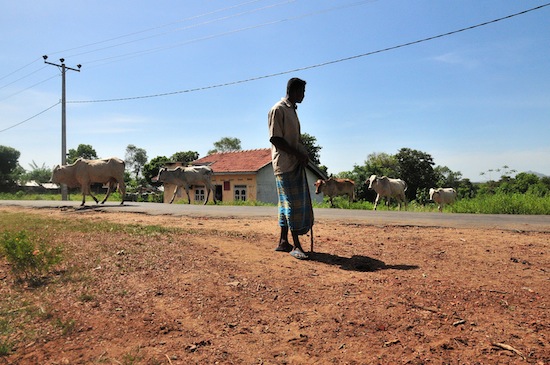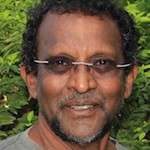What Are We Borrowing For?

 In the current tussle for political credibility, borrowing money for ‘development’ is equated with success. All politicians laud ‘development’ without any idea of what it means. The question ‘what is development’ was asked as early as February 1978, but our ‘leaders’, from that time onwards never had a answer and are still stuck in the same old rut of blind consumerism, enriching themselves and their cronies while getting the population deeper and deeper into debt.
In the current tussle for political credibility, borrowing money for ‘development’ is equated with success. All politicians laud ‘development’ without any idea of what it means. The question ‘what is development’ was asked as early as February 1978, but our ‘leaders’, from that time onwards never had a answer and are still stuck in the same old rut of blind consumerism, enriching themselves and their cronies while getting the population deeper and deeper into debt.
Meaning of Development (1978)
Development and progress are words that we are very familiar with and rightly so. As a nation all our hopes and aspirations are centred around the promises attendant on these processes. Yet recently there have been some questions on the values of ‘development’, and as in every controversial issue, the battle lines have been drawn. the combatants are, as is usual in these affairs, mostly from developed countries. the people of developing countries, more often than not, are mere witnesses to these esoteric exchanges. I do not intend to imply that these arguments are not valid; rather I would like to draw attention to the fact that often both points of view have their references deeply rooted in ‘developed’ or Western technological thought.
Development in the context of the current usage of the word certainly seems wedded firmly to Western technological thought. Whether we use it to describe an economic order or a social order, the roots are the same. e word development carries other connotations
in the context of present usage. It suggests that the country to be ‘developed’ is some way inferior to the model to which it aspires to become. the point here is: inferior by whose standards? To an industrialist from a Western country, a poor village in the third World does indeed need to be developed. A view, that will more often than not, be held by the rulers of the same country. To quote Richard Gott (CDN 1978).
“With the formal ending of colonial rule in all three continents of the third World, political independence was granted a tiny elite trained not to question the framework within which the world economy operated.”
It is this elite that laid the foundation for education of people in those countries, thus the value system operating and transmitted was certainly not endemic. With this perspective in mind, lets us attempt to look at ourselves.
We in Sri Lanka are continually talking about development. I believe that in the end this merely means an increase in industry and consumerism. It most certainly could not refer to a cultural or a philosophical development.
A country in which a major part of her population comprehends philosophical concepts that are addressable only by a minority of scholars in the West must certainly be, in comparative terms, more developed. An argument could be made that we also do not need to be more developed in our agriculture. Does an agricultural system that does not rely on any form of energy subsidy, other than biological energy, need to be ‘developed’ so its productivity becomes reliant on subsidized energy?
In the so-called developed world active research is under way for systems which are not subsidised by fossil fuel. We have it – and yet want to disrupt it in favour of energy intensive agricultural practices. Could this trend be attributed to the fact that most of our scholars are trained to look at problems in a purely Western technological perspective? Of course, all of us want to utilize our training for national good, but we should be careful and try to objectively evaluate the long-range repercussions of increased energy dependence.
Hartford Tomas (CDN 1978), who is a proponent of third World development, comments on the help given by developed countries to the ‘to be developed countries’:
“The philosophy of development from the grassroots comes up from the professionals, in Robert McNamara’s annual speeches and in the work of Schumacher’s intermediate development group.”
Well now, with all due respect for this illustrious gentlemen, I submit that the grassroots existed long before Robert McNamara’s discovery of them, and that if one reads Schumacher’s Small is Beautiful, one gets the distinct impression that Dr. Schumacher took many beautiful things from so called ‘underdeveloped’ countries. I do not mean to belittle the great words of these scholars, but wish to point out that they are addressing the developed world. So then, what help do we need from the professionals? To tell us what we already know about ourselves in ‘developed jargon’?
So we are still confronted with the dubiousness of the meaning of development. It would seem bizarre indeed if it transpired that we have been developing for the past 30 odd years mainly in a Western technological perspective. Some indication of our development can be addressed if we look at these questions in terms of the goals identified by those who describe the path. One of the standard answers to the development question is: the goal is economic growth. On this point Prof. Dudley Seers says, “in fact, it looks as if economic growth may not merely fail to solve social and political difficulties, certain types of growth can actually cause them”.
An important question is: who accepts responsibility for the results of this monomania for economic growth? Are we, by changing the value system, creating an artificial need for goods and services non- essential to our well-being as measured by any endemic standards? It may be useful to reflect again on a statement by Prof. Seers: ‘the social barriers and inhibitions of an unequal society distort the personalities of those with high incomes no less than those who are poor. Trivial differences of accent, language, dress, customs etc. acquire an absurd importance and contempt is engendered for those who lack social graces, specially country dwellers’.
Now let us take a case-in-point. Last week in the suburbs of Colombo, five youths were picked up for theft by the police. they each had on them at least Rs. 1000 worth of apparel (imported shirts, imported trousers, imported wristwatches, imported socks). their occupation? they were unemployed. How did they earn the money with which to buy the goods? they stole produce and other sellable items from the village. What was their need? they had to maintain their status (tathwaya). Is this development? How did these values come about? A.M. Hocart, who was the head of the Ceylon archaeological survey, wrote some poignant words that bear relevance to these phenomena.
